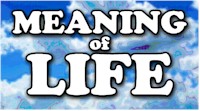|
|

 The Meaning of Life The Meaning of Life
Ecclesiastes 1:1-11, Matthew 5:1-6
by Rev. F. Schaefer
-
So, today is the first day of the new year, which causes
many to reflect on the meaning of life. As I was preparing the message, I
thought of the works of Douglas Adams entitled: The Hitchhiker's Guide to the
Galaxy. In one of his books he describes a futuristic scene in which a
supercomputer is given the question of finding an answer to the meaning of
life, the universe and everything. After 7.5 million years of calculating the
computer is ready to spit out the answer. Watch this little clip to find
out...
click here to watch
/download clip
click here to download the
NewYear PPT
So, according to this science fiction, 42 is the answer to the question of
everything, which in binary (the language of the computer) is 101010. It's
obviously a spoof answer that is making a point about the complexity and
difficulty of the question. However, when I googled 101010 I was surprised to
see how many "prophets" out there are taking this answer seriously enough to
try to come up with interpretations of what it could mean.
Read Ecclesiastes 1: 1-11 (The Message)
The words of the Teacher, son of David, king in Jerusalem: "Meaningless!
Meaningless!" says the Teacher. "Utterly meaningless! Everything is
meaningless." What does man gain from all his labor at which he toils under
the sun? Generations come and generations go, but the earth remains forever.
The sun rises and the sun sets, and hurries back to where it rises. The wind
blows to the south and turns to the north; round and round it goes, ever
returning on its course. All streams flow into the sea, yet the sea is never
full. To the place the streams come from, there they return again.
All things are wearisome, more than one can say. The eye never has enough of
seeing, nor the ear its fill of hearing. What has been will be again, what has
been done will be done again; there is nothing new under the sun. Is there
anything of which one can say, "Look! This is something new"? It was here
already, long ago; it was here before our time. There is no remembrance of men
of old, and even those who are yet to come will not be remembered by those who
follow.
The author of our bible passage from Ecclesiastes, Kohelet, also discusses the
meaning of life. It's actually quite surprising that his book was included in
the canon of the Hebrew and Christian bible, as it lacks orthodox theology. In
fact, these are the musings of a man, who in old age, lost his faith. He does
make a good point though, doesn't he?
I'm sure many of us here have experienced life as being humdrum or even
meaningless. We sometimes feel like an insignificant little cog in the
machinery of society. In the end nothing really changes; none of what we do or
say matters, none of it makes a lasting difference.
The question at the root of Kohelet's musings is an existential human
question. We want to know if our lives really make a difference on this
planet. Does it really matter how we live? Does our toil, our care, our
service really matter? That's really good new year's question, isn't it?
I think what all this expresses is our human yearning for a deeper meaning of
it all, and for a higher purpose. Most people carry this intrinsic desire in
their heart to prove Kohelet wrong. They look for a deeper meaning of life.
I think that's why Jesus of Nazareth had such an appeal on people. He gave
them reason to believe that there is a God who deeply cares and that there is
a higher purpose to their existence. In a sense, Jesus answered Kohelet's
skepticism.
In Jesus teachings, you don't have to look far to find deeper meaning in life;
God's kingdom is already among us and it is progressing. Again and again, he
pointed toward everyday situations in which God was present. The Kingdom of
God is like this tree, this farmer, this vinyard...
Jesus insisted that God not only exists, but deeply cares for humans and that
God has a plan, even though it may not appear like it to us at times. What I
find fascinating about Jesus' theology is that he looks for God, for deeper
meaning and God's kingdom especially the instances of human suffering. In his
most amazing speech titled: the Beatitudes, he illustrates that point.
Beatitudes (Mt. 5:1-12)
Blessed are the poor in spirit for theirs is the kingdom of heaven.
Blessed are they who mourn, for they shall be comforted.
Blessed are the meek, for they shall inherit the earth.
Blessed are they who hunger and thirst for righteousness, for they shall be
satisfied.
Blessed are the merciful for they shall obtain mercy.
Blessed are the pure of heart, for they shall see God.
Blessed are the peacemakers, for they shall be called children of God.
Blessed are they who are persecuted for the sake of righteousness, for theirs
is the
kingdom of heaven.
Jesus is saying that in God's Kingdom everything is upside down. To the
mighty, rich and powerful he says: beware, lest you be judged. And to the
poor, those who live out their faith, and especially those who suffer he gives
an incredible vision. In the darkest moments of life you are closest to God
and God's Kingdom. You're never as close to the sky as when your knees touch
the ground. Every bit of your suffering God will turn into a joy, into a
reward. Every good deed, every kind gesture, every act of compassion you do
will make a difference.
Remarkably, Jesus' theology gives us hope even for the new
year. With Jesus, we no longer feel powerless to make a difference in this
world.
Jesus is saying, no matter how bad things are, what you do will make a
difference. And as you hang in there and stay the course in living out your
faith, in following in my footsteps, you will see that and there will be a
reward. In this vein let me close by saying: happy new year!
|
|